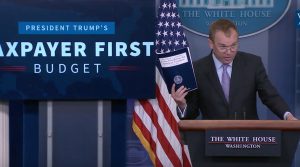
President Trump is proposing to open the Arctic National Wildlife Refuge to oil drilling. That’s one detail from the budget the White House delivered to Congress Tuesday. The document fleshes out the “blueprint” released in March. Here are three things an Alaskan should know about Trump’s budget plan, “The New Foundation for American Greatness.”
- The president’s budget doesn’t actually open the Arctic Refuge to oil drilling. Congress would have to pass legislation to let the rigs in. But a president’s budget is about vision as well as numbers. Interior Secretary Ryan Zinke made that clear as he discussed the ANWR portion of the document.
“The president has used the term ‘energy dominance,’ and quite frankly Alaska is important, if we’re going to reach dominance, Alaska is important. And that pipeline is extraordinarily important,” Zinke told reporters.
The budget assumes ANWR revenues would begin in 2022 and total $1.8 billion over 10 years.
Taxpayers for Commonsense President Ryan Alexander noted that all eight budgets in the George W. Bush administration included ANWR revenues but that wasn’t enough to open the refuge. ANWR is one of many items on the revenue side of Trump’s budget that Alexander calls “speculative.”
“I don’t know whether or not this is a policy statement, consistent with what we’ve heard from President Trump, that he wants to open public lands for development and exploration, or if he was just looking for a little more change under the couch cushions,” Alexander said.
2. The budget, as expected, has deep cuts, especially for rural Alaska. The president proposes to cut more than half of the funding for the Denali Commission. According to one of the supporting documents:
“The rationale for a unique and additional Federal subsidy to Alaska is difficult to justify given that the State of Alaska’s oil revenues allow it to pay an annual dividend ($1,022 in 2016) to each of its residents.”
The budget would also zero out a $20 million program for Alaska village water systems, slash funds for Alaska Native education and housing, and eliminate subsidized flights under Essential Air Service.
That’s in addition to cuts that will apply nationally, to food stamps, Medicaid and disability programs.
3. This is all just a proposal. Congress decides how to appropriate money. Sen. Lisa Murkowski sits on the Senate Appropriations Committee. She said she likes the president’s emphasis on Arctic oil production and bolstering defense. But Murkowski said she “strongly” disagrees with what she called “the drastic cuts to programs intended to help the most vulnerable among us.”
Liz Ruskin is the Washington, D.C., correspondent at Alaska Public Media. Reach her at lruskin@alaskapublic.org. Read more about Liz here.





